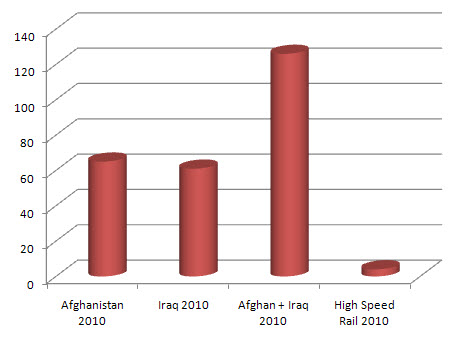I've often written about my frustration with the U.S. occupation in Afghanistan. I don't see any real progress. What business would be willing to keep spending huge amounts of money without seeing any progress? Yet our government continues to do this. And I have yet to see any meaningful government benchmarks regarding Afghanistan, probably because there aren't actually any benchmarks. We have also kept our troops in Afghanistan because of the sunk costs fallacy; we are there shedding blood and inconceivable numbers of tax dollars because we've been there. It is circular and insane.
I can think of yet another reason that we are still there. All you need to do is follow the money. An acquaintance of mine recently informed me that a close relative of hers, formerly a career military man, quit the military but stayed in Afghanistan. For the past few years he's been making $250,000 per year in Afghanistan doing essentially the same job that he had been doing with the military. She told me that there are large numbers of these private soldiers in Afghanistan making similar obscene amounts of money. If our mission in Afghanistan were really vital to national security, then we should be allowing our government military handle the situation. You know, the same guys who prevailed in Iwo Jima.
But no. The private contractors are swarming all over Afghanistan:
According to a report last week from the Congressional Research Service, there were about 64,000 uniformed U.S. troops in Afghanistan in September and 104,101 military contractors . . . The Obama administration's planned deployment of 30,000 more troops in the coming months could require as many as 56,000 more contractors, the report estimated. Xe, the Moyock, N.C.-based private military company, is already on the ground in Afghanistan despite its controversial history in Iraq, and is in the running for additional contracts.
It's also becoming clear that economically powerful companies are convincing our politicians that we need to be there, whether or not there is actually a well-defined mission.
Even Blackwater (now renamed "Xe") is in the thick of it.
Charles Lewis reports:
Fascinated and alarmed by the Tammany Hall feeling of political favoritism or cronyism I was getting, we launched into another epic investigation and published "Outsourcing the Pentagon: Who's Winning the Big Contracts" in the fall of 2004. We examined 2.2 million contract actions over six fiscal years, totaling $900 billion in authorized expenditures, and discovered that no-bid contracts had accounted for more than 40 percent of Pentagon contracting, $362 billion in taxpayer money to companies without competitive bidding. In other words, the multi-billion dollar no-bid contracts Halliburton had received actually weren't such an aberration, unfortunately. Indeed, we found contractors had written the Department of Defense budget, were guarding our soldiers in the Green Zone in Iraq, had participated in the Abu Ghraib interrogations and when the Secretary of Army wanted to find out just how many contractors were being employed, he naturally hired a company to find it out.
That was back in 2004. It's much worse now, which you can see by examining these links at
Citizens for Legitimate Government. Check out this chart demonstrating that the
high-priced private contractors far outnumber U.S. soldiers. Oh, and
read the advertisements to see what kind of people are signing up to "fighting for our freedom" overseas:
Thousands of men and women have said goodbye to the 9-5 dead-end hometown job lock-down and are happily hopping from one country to the next. With nothing to worry about but where to spend their 3 months vacation or what to do with all the money they have made 99.9% of the population doesn’t have this luxury – because they don’t know about it. They have never even heard of High Paying International Civilian Contractor Jobs. Your career doesn’t have to be connected to just one country; you can work wherever you want! If it’s the Big Bucks that you’re looking for, then places like Iraq and Afghanistan are paying 6 figs.
What is
the historical context of the ratio of contractors to soldiers?
According to a Congressional Research Service report obtained by the Federation of American Scientists blog Secrecy News, the ratio of contractors to troops is higher "than in any conflict in the history of the United States."
The phenomenon Eisenhower called the military-industrial complex is alive and well. There are so very many
better ways to spend these tax dollars. Actually, we are spending tax dollars that we don't actually have in Afghanistan. And we're spending and fighting regarding "terrorists"
who are almost non-existent in Afghanistan.
U.S. intelligence officials have concluded there are only about 100 al Qaeda fighters in the entire country.
With 100,000 troops in Afghanistan at an estimated yearly cost of $30 billion, it means that for every one al Qaeda fighter, the U.S. will commit 1,000 troops and $300 million a year.
It's time to pull the plug on this "war," in which our main accomplishment seems to be protecting the opium trade.

